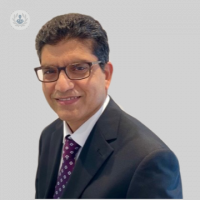Surgery for Overactive thyroid (Graves’ disease)
Written in association with:Graves’ disease is an autoimmune disorder which leads to hyperthyroidism, which is also known as overactivity of the thyroid gland. When non-surgical treatments are ineffective or not suitable, surgery may be recommended.
Leading consultant ENT surgeon Mr Ijaz Ahmad provides an expert overview of what to expect with surgery for an overactive thyroid due to Graves' disease in this article.

What is Graves' disease?
Graves' disease causes the thyroid gland to produce excessive amounts of thyroid hormone, leading to symptoms such as:
- Rapid heartbeat
- Weight loss
- Increased appetite
- Nervousness or irritability
- Heat intolerance
- Enlarged thyroid gland (goitre)
Why consider surgery?
Surgery is considered for various reasons:
- Non-responsive to medication: When anti-thyroid medications fail to control hormone levels.
- Adverse reactions: If patients experience severe side effects from medications.
- Large goitre: Causing compression symptoms like difficulty swallowing or breathing.
- Pregnancy: In cases where it’s advised to not take certain medications.
- Cancer suspicion: If there’s a possibility of thyroid cancer.
Types of surgery
Total thyroidectomy
- Removal of the entire thyroid gland.
- Eliminates the source of thyroid hormone production.
Subtotal (Partial) thyroidectomy
- Removal of part of the thyroid gland.
- Less common for Graves' disease due to risk of recurrence.
The surgical process
Consultation
- Detailed discussion with an endocrinologist and surgeon.
- Preoperative tests including blood tests, ultrasound and possibly fine-needle biopsy.
Preparation
- Stabilising thyroid hormone levels with medication.
- Possible iodine treatment to reduce thyroid gland size and blood flow.
- Instructions on fasting and medications before surgery.
Surgery
- Performed under general anaesthesia.
- Incision made in the lower neck.
- Removal of the thyroid gland, ensuring careful protection of surrounding structures such as the parathyroid glands and recurrent laryngeal nerve.
- Duration: two to four hours, depending on complexity.
Recovery
- Hospital stay for one to two days post-surgery.
- Pain management with prescribed medications.
- Monitoring calcium levels due to potential impact on parathyroid glands.
- Follow-up appointments to monitor recovery and hormone levels.
What are the potential risks and complications?
As with any surgery, thyroidectomy carries certain risks:
- Bleeding: Can occur during or after surgery.
- Infection: At the incision site.
- Hoarseness: Temporary or permanent, due to nerve damage.
- Hypocalcaemia: Low calcium levels if parathyroid glands are affected.
- Scar: Minimal and typically fades over time.
Post-surgery care
Proper care is crucial for a successful recovery:
- Thyroid hormone replacement: Lifelong medication is required after total thyroidectomy.
- Wound care: Keep the incision clean and dry.
- Activity restrictions: Avoid strenuous activities for a few weeks.
- Diet and supplements: Calcium and vitamin D supplements may be necessary.
Long-term management
After surgery, ongoing management is essential:
- Regular monitoring: Blood tests to check thyroid hormone levels.
- Adjusting medication: Fine-tuning of hormone replacement therapy.
- Symptom awareness: Monitoring for signs of hormone imbalance.
Questions to ask your surgeon
- What type of thyroidectomy is recommended for my case?
- What are the risks and benefits of surgery?
- How long will the recovery process take?
- What follow-up care will I need after surgery?
Surgery for an overactive thyroid is a significant but often necessary step for those who do not respond to other treatments. By understanding the surgical process, potential risks, and post-surgery care, patients can make informed decisions and manage their condition effectively with the guidance of their healthcare team.
Do you require surgery for an overactive thyroid? Arrange a consultation with Mr Ahmad via his Top Doctors profile.


